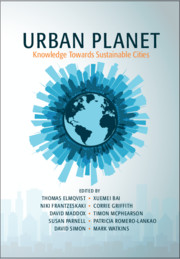16 results
23 - Urban Experimentation and the Role of Senses of Place
- from Part VII - Design and Planning Strategies for Changing Senses of Place
-
-
- Book:
- Changing Senses of Place
- Published online:
- 15 July 2021
- Print publication:
- 05 August 2021, pp 301-312
-
- Chapter
- Export citation
Part II - Global Urban Sustainable Development
-
- Book:
- Urban Planet
- Published online:
- 27 April 2018
- Print publication:
- 26 April 2018, pp 147-260
-
- Chapter
-
- You have access
- Open access
- HTML
- Export citation
Contents
-
- Book:
- Urban Planet
- Published online:
- 27 April 2018
- Print publication:
- 26 April 2018, pp v-ix
-
- Chapter
-
- You have access
- Open access
- HTML
- Export citation
Tables
-
- Book:
- Urban Planet
- Published online:
- 27 April 2018
- Print publication:
- 26 April 2018, pp xv-xv
-
- Chapter
-
- You have access
- Open access
- HTML
- Export citation
Preface
-
- Book:
- Urban Planet
- Published online:
- 27 April 2018
- Print publication:
- 26 April 2018, pp xxi-xxx
-
- Chapter
-
- You have access
- Open access
- HTML
- Export citation
Synthesis - New Integrated Urban Knowledge for the Cities We Want
-
-
- Book:
- Urban Planet
- Published online:
- 27 April 2018
- Print publication:
- 26 April 2018, pp 462-482
-
- Chapter
-
- You have access
- Open access
- HTML
- Export citation
Figures
-
- Book:
- Urban Planet
- Published online:
- 27 April 2018
- Print publication:
- 26 April 2018, pp x-xiv
-
- Chapter
-
- You have access
- Open access
- HTML
- Export citation
Chapter 14: - To Transform Cities, Support Civil Society
- from Part III - Urban Transformations to Sustainability
-
-
- Book:
- Urban Planet
- Published online:
- 27 April 2018
- Print publication:
- 26 April 2018, pp 281-302
-
- Chapter
-
- You have access
- Open access
- HTML
- Export citation
Chapter 13: - Sustainability Transformation Emerging from Better Governance
- from Part III - Urban Transformations to Sustainability
-
-
- Book:
- Urban Planet
- Published online:
- 27 April 2018
- Print publication:
- 26 April 2018, pp 263-280
-
- Chapter
-
- You have access
- Open access
- HTML
- Export citation
Part I - Dynamic Urban Planet
-
- Book:
- Urban Planet
- Published online:
- 27 April 2018
- Print publication:
- 26 April 2018, pp 17-146
-
- Chapter
-
- You have access
- Open access
- HTML
- Export citation
Contributors
-
- Book:
- Urban Planet
- Published online:
- 27 April 2018
- Print publication:
- 26 April 2018, pp xvi-xx
-
- Chapter
-
- You have access
- Open access
- HTML
- Export citation
Part III - Urban Transformations to Sustainability
-
- Book:
- Urban Planet
- Published online:
- 27 April 2018
- Print publication:
- 26 April 2018, pp 261-350
-
- Chapter
-
- You have access
- Open access
- HTML
- Export citation
Copyright page
-
- Book:
- Urban Planet
- Published online:
- 27 April 2018
- Print publication:
- 26 April 2018, pp iv-iv
-
- Chapter
-
- You have access
- Open access
- HTML
- Export citation
Part IV - Provocations from Practice
-
- Book:
- Urban Planet
- Published online:
- 27 April 2018
- Print publication:
- 26 April 2018, pp 351-461
-
- Chapter
-
- You have access
- Open access
- HTML
- Export citation

Urban Planet
- Knowledge towards Sustainable Cities
-
- Published online:
- 27 April 2018
- Print publication:
- 26 April 2018
-
- Book
-
- You have access
- Open access
- Export citation
7 - Developing Transformative and Orchestrating Capacities for Climate Governance Experimentation in Rotterdam
- from Part II - Beyond Experiments
-
-
- Book:
- Innovating Climate Governance
- Published online:
- 29 March 2018
- Print publication:
- 29 March 2018, pp 123-144
-
- Chapter
- Export citation

